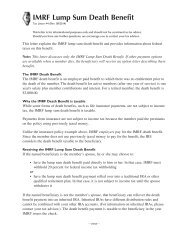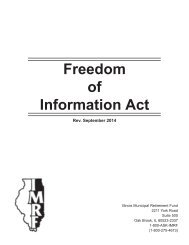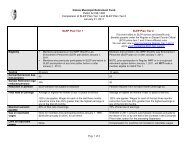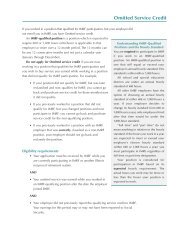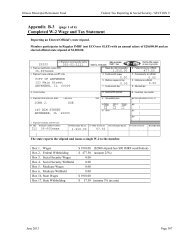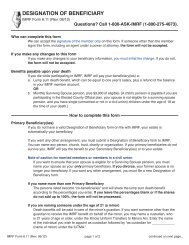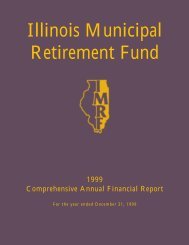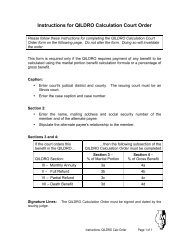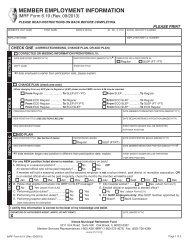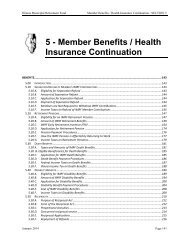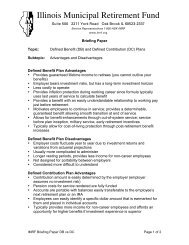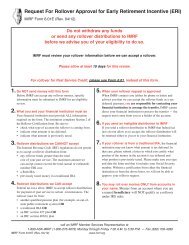Section 6 - IMRF
Section 6 - IMRF
Section 6 - IMRF
You also want an ePaper? Increase the reach of your titles
YUMPU automatically turns print PDFs into web optimized ePapers that Google loves.
Member Accounts / Past Service / Employer Resolutions / SECTION 6<br />
Illinois Municipal Retirement Fund<br />
<strong>IMRF</strong> member contributions are to be deducted from the payment and remitted to <strong>IMRF</strong>. In addition,<br />
counties are required to make employer contributions on the gross amount. The ECO employer<br />
contribution rate is applied to stipends for those officials enrolled in the ECO plan.<br />
Generally stipends are paid once a year and cover 12 months of elected service. There is an exception<br />
if the official ceases to hold office. In that case, the stipend is prorated and payment is made for each<br />
month the official held office since his or her last stipend payment.<br />
Stipends are an annual payment and if not previously reported should be reported as such when<br />
terminating an ECO plan member’s participation.. The total amount reported for the final earnings<br />
should never exceed the annual salary plus one annual stipend amount. In other words, if during one<br />
calendar year an official receives both the usual 12-month stipend payment plus a second stipend<br />
payment for a partial year to reflect the last portion of his or her term in office, you would report only<br />
the 12-month amount.<br />
Example 1<br />
An official makes $40,000 per year and receives an annual stipend of $3,600. The stipend is paid every<br />
July for the previous July 1 through June 30 period. The official resigns on September 30. When<br />
completing the termination, you would report at an annual salary of $40,000 and an annual stipend of<br />
$3,600. Do not report a stipend of $4,500 ($3,600 plus $900 for 3 months at $300 per month).<br />
Example 2<br />
An official makes $44,500 per year with an annual stipend of $3,600 paid in July. However, beginning<br />
July 1, the annual stipend was increased to $5,000. The official leaves office on December 2. At the<br />
time he left office he has yet to receive his prorated stipend for the July through November period (in<br />
fact, payment is not received until the following February). When completing the termination, you<br />
would report an annual salary of $44,500 and an annual stipend of $5,000. This is because the statute<br />
requires <strong>IMRF</strong> to use the salary in effect on the date of termination ($44,500 and $5,000).<br />
b. Per Diem earnings<br />
Some County Board members receive a payment for each County Board or Committee meeting<br />
attended. Unlike salaried officials, you cannot merely rely on the salary schedule in effect on the date<br />
of termination. The per diem payments vary widely from month to month. When completing the final<br />
earnings and contributions report, include as final annual salary the total per diems paid to the official<br />
within the last 12 months of his or her service.<br />
Example 3<br />
The County pays per meeting attended. The Board member leaves office on December 2 (without<br />
attending any meetings that month). During the last 12 months of the term, the board member attended<br />
one meeting in December of last year, no meeting in January, three meetings per month for nine<br />
months, and six meetings in the last month for a total of 34 meetings. He or she was paid $3,400<br />
during the 12-month period. Enter $3,400 as the final annual salary earned.<br />
Example 4<br />
Same facts as in Example 5, except the official turns in all his or her per diem requests in November,<br />
the month before leaving office. His or her final annual salary earned is $3,400. It is not $3,400 times<br />
12 months or $40,800.<br />
c. Expense Reimbursements (Mileage, Meals)<br />
Expense reimbursements are not <strong>IMRF</strong> earnings and should not be added to an official’s salary or per<br />
diem. They should not be reported to <strong>IMRF</strong> as part of the official’s final annual salary.<br />
d. Premium Pay<br />
Many Counties pay Board members an additional amount to participate on committees, to be<br />
committee chairpersons or to be Board President. Some Board Presidents receive an additional<br />
payment to be liquor commissioner. This premium pay is considered <strong>IMRF</strong> earnings and should be<br />
reported to <strong>IMRF</strong>.<br />
Page 240 January 2014



